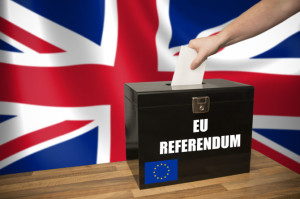
Ì̀bò Ọ̀rọ̀ Ìlu ni Ìlú-Ọba’ UK Referendum
Ni Ìlú-Ọba, lẹhin ọdún mẹtalelogoji, èrò jade lati di ìbò bẹni-bẹ́ẹ̀kọ́ lori àjọṣepọ̀ pẹ̀lú ẹgbẹ́ Ìlú-Oyinbo méjidinlọ́gbọ̀n ni Ọjọ́bọ̀, oṣu Kẹfa, ọdún Egbàálémẹẹdógún. Idibò na a lọ wẹ́rẹ́ lai si ìjà, kò gbà ju ìṣéjú kan si meji lọ lati wọlé dibò ti ó bẹ̀rẹ̀ ni agogo meje àárọ̀ titi di aago mẹwa alẹ́. Lẹhin idibò, ni òwúrọ̀ kùtùkùtù ọjọ́ keji idibò, ni ọjọ́ Ẹti, ọjọ́ kẹrinlélógún, oṣù kẹfa, èsi ibò jade pé ibò bẹ́ẹ̀kọ́ ju ibò bẹni lọ, eyi ti ó túmọ̀ si wi pé, ará ilú ti ó fẹ́ ki wọn ‘kúrò’ ni ẹgbẹ́ Ilú-Oyinbo pọ̀ ju àwọn ti wọn ó fẹ́ ki wọn ‘dúró‘ ninú ẹgbẹ́.
Bi èsì ibò ti jade, Olóri Òṣèlú Ilú-Ọba, David Cameron, jade lati bá ará ilú sọ̀rọ̀. Ninú ọ̀rọ̀ rẹ, ó ni nitori ohun polongo ki wọn dúró ninú ẹgbẹ́ Ilú-Oyinbo ṣùgbọ́n àwọn aráilú ti sọ̀rọ̀ wi pé ki wọn kúrò, nitori eyi ohun yio gbé Ijọba silẹ̀.
Ẹ̀kọ́ fún Ìjọba tiwa ntiwa ni orilẹ̀ èdè Nigeria ni wi pé iwá ibàjẹ́ ti àwọn Òṣèlú nhu ni Àbùjá lai fi eti si ará ilú pé àwọn ẹ̀yà mẹ́yà orilẹ̀ èdè Nigeria fẹ́ dá Ìjọba wọn ṣe ju ki Òṣèlú joko si Àbùjá lati maa na owó gbogbo ará ilú. Ó yẹ ki wọn ronú bi wọn yio ti ṣe Ìjọba ti yio mu irọ̀rùn ba gbogbo ipinlẹ Nigeria. Ki wọn fi eti si ohun ti ará ilú lati Guusu dé Àriwá sọ, pé ki wọn joko sọ̀rọ̀ bi wọn yio ti ma bára gbé. Igbe àwọn Igbo ti pọ si lẹhin ti wọn jagun abẹ́lé, àwọn ẹya miran bi Yorùbá nkun ni abẹ́lẹ̀ pé àwọn ma fẹ dá dúró ki wọn san iṣákọ́lẹ̀ fún Ìjọba àpapọ̀.
Ó yẹ ki Òṣèlú Nigeria ṣe àyẹ̀wò òfin ti aṣojú Ilú Ọba – Lugard fi da Guusu àti Àríwá pọ fún irọ̀rùn ìṣàkóso orilẹ̀ èdè Nigeria ni ọgọrunlemeji ọdún sẹhin. Nigeria gba Òmìnira ni bi ọdún mẹrindinlọgọta sẹhin. Lẹhin Òmìnira, àwọn Òṣèlú pàtàki ni Ìwọ̀-oòrùn lábẹ́ Olóògbé Olóyè Ọbáfẹ́mi Awólọ́wọ fi ipò Òṣèlú ṣe iṣẹ́ ribiribi lati jẹ́ ki àwọn ará ilú jẹ èrè Òmìnira, ṣùgbọ́n lati igbà ti Ìjọba Ológun ti ó fi ibọn gba Ìjọba ti bẹ̀rẹ̀ si ṣe Òṣèlú ni ilú ti bàjẹ́ si, wọn si rò wi pé àwọn lé fi ipá kó orilẹ̀ èdè pọ.
ENGLISH TRANSLATION
On Thursday, twenty-third of June, 2016, the United Kingdom, after forty-two years, went to cast the vote of simple “Yes or No” in a referendum to determine either to ‘Remain or Leave’ the European Union, made up of twenty-eight countries. The voting which began at seven o’clock in the morning and closed at 10 o’clock at night, went on peacefully without any fracas, and it took one or two minutes for voters to exercise their right. The result was announced very early on Friday morning, twenty-fourth of June 2016, that the ‘Leave Campaigners’ had won more votes than the ‘Remain Campaigners’.
As the result was announced, the Prime Minister, David Cameron, addressed the public. In his speech he said he campaigned to ‘Remain’ believing it was the best for the country but the people have voted otherwise, hence he tendered his resignation.
The lessons for the democratic government in Nigeria as a Nation, is to listen to the voice of the people clamouring for more autonomy, rather than ignore their demands and continue with the business as usual of looting the public treasury in Abuja. It is important to think of how to bring the government closer to the people in response to the quest from the North to the South for ‘Sovereign National Constitutional Conference’ to discuss how Nigerians should continue to live together. After the civil war, the Igbos are still pressing to govern themselves, while underground, the Yoruba ethnic group would want more autonomy as they pay tax to the central Government.
The Nigerian Politicians should re-examine 1914 Amalgamation of the North and South by British Colonial Governor Fredrick Lugard. Nigeria got her independence about fifty six years ago. After independence, prominent Politicians in Western Nigeria led by Late Chief Obafemi Awolowo worked tirelessly to deliver the benefits of independence, but since the military incursion, the country has retrogressed as the military believed they could forge unity by the power of the gun.
Originally posted 2016-06-24 13:52:05. Republished by Blog Post Promoter


